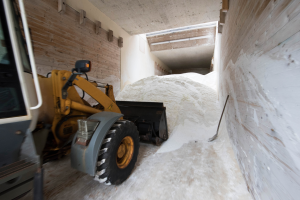by Andres Clavier, Freshwater Stewardship Education Intern
The environmental repercussions of excessive salt application have instigated numerous research and policy endeavours. One significant contribution in this area is the “Code of Practice for the Environmental Management of Road Salts” developed by Environment and Climate Change Canada (ECCC). This post delineates the salient practices endorsed by this code for salt authorities, emphasizing the reduction of salt-induced environmental pollution.
The ECCC recommends that salt authorities prepare a comprehensive salt management plan. Authorities are encouraged to conduct risk assessments identifying areas vulnerable to salt contamination and develop a framework outlining storage, application rates, and equipment calibration procedures. Proper storage mitigates salt leaching and runoff. Best practices include storing salt on impermeable pads, ensuring coverage of salt piles to minimize exposure to precipitation, and employing structures or barriers to reduce salt runoff.

Accurate application of salt is contingent on well-calibrated equipment and trained personnel. Individual contractor or private resident contractor often have much higher per capita use so it is important to have both municipal level reduction and alternative use as well as individual personal reductions. The Code emphasizes the regular calibration of spreading equipment, and the importance of training programs for operators so they efficiently apply salt. Where possible, exploring and adopting alternative agents can reduce salt usage. The Code advises the evaluation of alternative de-icing and anti-icing materials, and the integration of these materials into management plans (contingent on their environmental compatibility).
To gauge the efficacy of salt management endeavours and environmental outcomes, monitoring and reporting are paramount. Authorities should regularly monitor salt usage, storage conditions, and application rates. It is important for them to regularly submit annual reports, elucidating efforts and progress in salt reduction and environmental protection. Educating the public can amplify the effectiveness of salt reduction strategies as well. As such, the Code recommends outreach programs elucidating the environmental implications of salt and engaging communities in salt reduction campaigns and initiatives. Learn more about the Code and other policy tools that can be used in the salt discussion by downloading our Salt Policy Review.
Watersheds Canada’s salt education campaign will help you advocate for more sustainable practices in your community. By supporting regulations, monitoring, and liability, we can safeguard our aquatic ecosystems, protect wildlife, and ensure the continued purity of our nation’s waters. Your participation could be the ripple effect needed to spark change. Share this information with loved ones and peers, emphasizing the significance of joining hands against salt pollution. Learn more about the salt awareness campaign on our website.
References
Environment and Climate Change Canada. (2004). Code of Practice for the Environmental Management of Road Salts. Ottawa, ON: Government of Canada.
This piece is part of an education toolkit generously funded by:



Why not save all the money, time, equipment, labour, water, lakes, waterways, roads etc.
Just use a non chloride, 100% biodegradable, non toxic, non corrosive, ready to use, de icer, anti icer, preventing moisture from freezing, down to minus 40 and minus 60 degrees celcius.